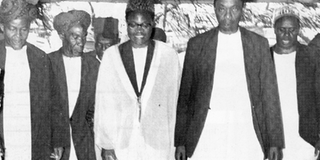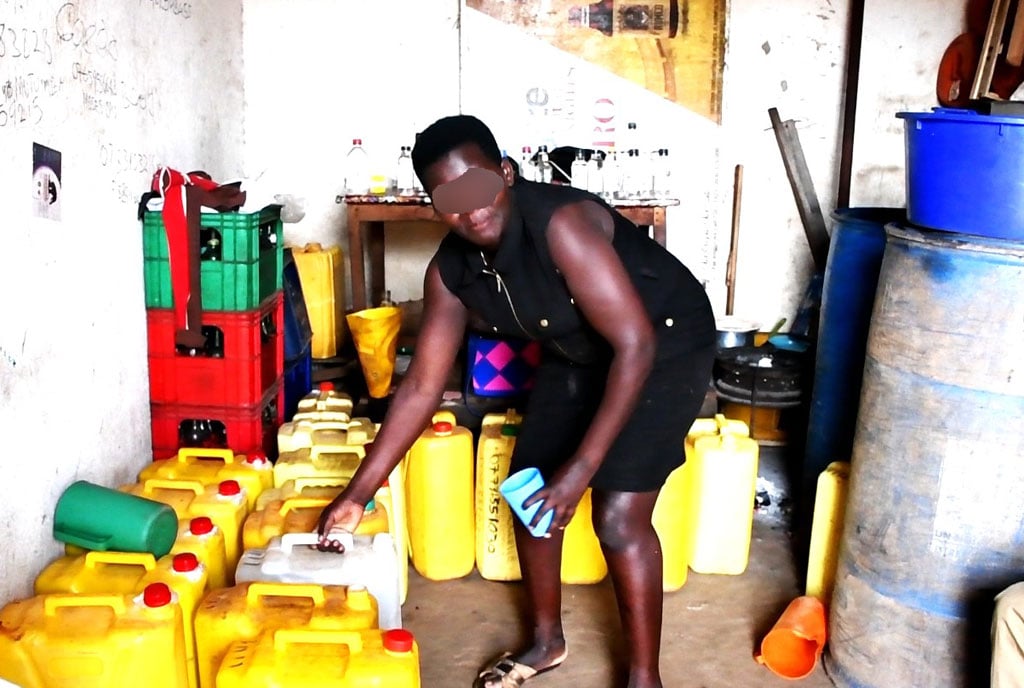Prime
Abu Mayanja and Muslim politics at independence

Buganda’s Muslim leaders. Abubakar Mayanja (C), Badru Kakungulu (2R), K. Nakibinge (R) COURTESY PHOTO
What you need to know:
Regaining space. Through Kabaka Yekka party, Badru Kakungulu and Abu Mayanja renegotiated their community’s position in the post-colony, reclaiming political space that had been lost as early as the 1890s.
Well-connected to Buganda’s conservative farming communities, Ignatius Musaazi, Abubakar Mayanja and other UNC activists, constituted the salient voice of opposition against E.M.K. Mulira’s constitutional reforms.
As dissimilar as Musaazi’s and Mulira’s projects were, however, their sociality was distinctly shaped by Protestant forces. Conjugally, Musaazi’s wife was the daughter of the heir of Apolo Kaggwa; Mulira’s wife, the daughter of Hamu Mukasa.
Musaazi was the son of an important Protestant chief in Bulemeezi; Mulira, a Protestant royal of Kooki heritage. Shaped by the mentorship of Canon Grace, both Musaazi and Mulira were disciples of the Native Anglican Church.
While both Musaazi and Mulira sought to reinvent Buganda’s monarchy, they tended to not question Protestant legitimacy—it was taken for granted. In this, both Musaazi and Mulira built upon Buganda’s Protestant past; it was not dismissed.
From power to periphery
Not royal, wealthy or Christian, Mayanja was the organising secretary-treasurer of the UNC. Keenly historical and acutely practical in his approach to politics, Mayanja, according to one activist, was the “best political brain and potentially the hardest drive in Congress”.
Indeed, Mayanja’s forthright politics discomforted both Christian Baganda and Britons. Kawalya Kaggwa disclosed to Audrey Richards that he suspected Mayanja would, upon completing his studies in Cambridge, “come back and make trouble”. Upon hearing Mayanja speak at a World University Service conference in March 1954, Oxford’s Margery Perham “felt almost physically sick listening to him”.
In the Uganda Argus in 1958, Mayanja declared that he had crossed the Rubicon, setting himself politically against, “any autocracy whether it be foreign and imperialist or native and feudal.”
But within two years, he was one of Mengo’s leading spokesmen. Historians and political activists have found Mayanja’s decision to help lead KY in the early 1960s puzzling, the decision of an opportune politician without principle.
However, a closer look at the sources from this period reveal something very different—that Mayanja’s decision to join KY was based upon Muslim conviction, anything but political compromise.
Half a century before Apolo Kaggwa published Bassekabaka be Buganda, Buganda received her first Muslim guest(s), Zanzibari missionary-traders.
Buganda’s Muslim kings and converts maintained central power in Buganda’s political landscape up until the 1880s, when superior weaponry allowed Christian chiefs and colonisers to secure power in the 1890s, resulting in the marginalisation of Ganda Muslims.
As religious war dissipated, Muslim leaders were challenged to navigate the waters of Christian ascendency. Militarily disadvantaged, Buganda’s new leader, Omulangira Nuhu Mbogo, was not in a position to reassert his community’s claim to Buganda’s monarchy. For the foreseeable future, Ganda Muslims would have to think and advocate creatively from the political periphery.
From the late 1930s to early 1950s, Muslim leaders contested [B]Uganda’s colonial state from the margins. Education policy favoured Christian powerbrokers in early 20th century Buganda, where the development of schools was tied to the progress of Christian mission.
In the 1940s, Muslim leaders theorised education as a tool to contest Buganda’s public sphere. Through the educational politics of Badru Kakungulu Wasajja, Ganda Muslims sought to equip an up-and-coming generation of younger Muslims to engage in public discourse.
In the mid 20th century, also, Muslim activists used history to assess the political projects of Buganda’s powerbrokers, critiquing the historicism of Apolo Kaggwa.
Muslim intellectuals imagined a past from whence political participation was made meaningful in the colonial state. This effort resulted in the publication of histories written by Muslims in the mid 20th century, especially Sheikh Ali Kulumba.
Mayanja’s social context positioned him to build upon earlier Islamic political tradition. Due to intellectual aptitude and strong examination performance, Mayanja secured placement at King’s College Budo in 1945, where he was identified as a future leader for Buganda’s Muslim community.
For Mayanja and Buganda’s Muslim community, Kabaka Muteesa’s deportation in 1953 was used to critique colonial power and contest seats in Buganda’s Christian Lukiiko. Mayanja—then at Cambridge—argued what Muslims had talked about for two previous generations: Buganda was subject to a state possessed with preserving its own power.
The 1955 katikkiro election resulted in Buganda’s Muslims being apportioned posts in the new government, particularly the ministry of education. Following the death of Buganda’s first Muslim minister of education, Mayanja was approached by Badru Kakungulu to fill the vacancy, an invitation he accepted.
From 1960 onward, Mayanja’s public identification with Islam in Buganda increased. Until then, Mayanja directionalised Congress’ anti-colonial nationalism. But Mayanja’s project in late colonial Buganda was not simply about imagining dissenting space for Ganda nationalists; it would come to be about creating political space for Muslims in Buganda’s Protestant hierarchy.
By accepting Kakungulu’s invitation, Mayanja committed to fulfil what he had defined in the early 1950s as a “sacred intention” to serve Buganda’s Muslims.
In course, Muslims used Kabaka Yekka (KY) party to reposition themselves in Buganda’s monarchy. As Professor A.B.K. Kasozi has shown, Kakungulu advocated for the political merger between KY and UPC among [B]Uganda’s Muslim communities, admonishing Muslims in Ankole, Bugisu and Busoga to vote for Milton Obote’s UPC, and Muslims in Buganda to vote KY.
Through well-calculated politics, 40 per cent of KY’s central executive and seven out of 15 of the members of the elected policy-making body was Muslim by 1963, though Muslims constituted only 15 per cent of Buganda’s population. Kakungulu’s strategy proved brilliant and effective.
Kakungulu’s effort to renegotiate political space in the early 1960s was further directionalised by two Muslim historians, Mayanja and Sheikh Kulumba. In fact, before studying law, Mayanja had read history at Cambridge.
Early into KY/UPC negotiations, Mayanja helped facilitate discussion between Muteesa II and Milton Obote. By 1961, Mayanja had become the public intellectual of KY, drafting the majority of the party’s numerous treatises.
Mayanja participated in the private negotiations between KY and UPC in 1963, where he and Sheikh Kulumba were appointed to represent Buganda’s Muslim community.
Move away from the periphery
Mayanja simultaneously served as a translator for Kulumba, who spoke only Luganda and Arabic. Minutes from KY/UPC negotiations show that Mayanja dominated discussion, defending Buganda’s government against Milton Obote’s UPC activists. Often in the height of debate, Kulumba proffered his critique alongside Mayanja’s. To the point, in 1963 Mayanja and Kulumba were not only representatives of Buganda’s Muslim community—they now constituted the formal voice of Buganda’s kingdom.
For two to three generations, Buganda’s Muslim activists had been marginalised from the heart of Ganda politics.
Through KY, Badru Kakungulu and Muslim historians renegotiated their community’s position in the post-colony, reclaiming political space lost in the 1890s. By claiming their position in the post-colony, Ganda Muslims would shape the internal affairs of Buganda’s kingdom in the 1960s in ways not possible during colonialism.
The writier is a Visiting Assistant Professor of African History at Centre College and received his PhD from the University of Cambridge in 2012.
Continues Monday.




